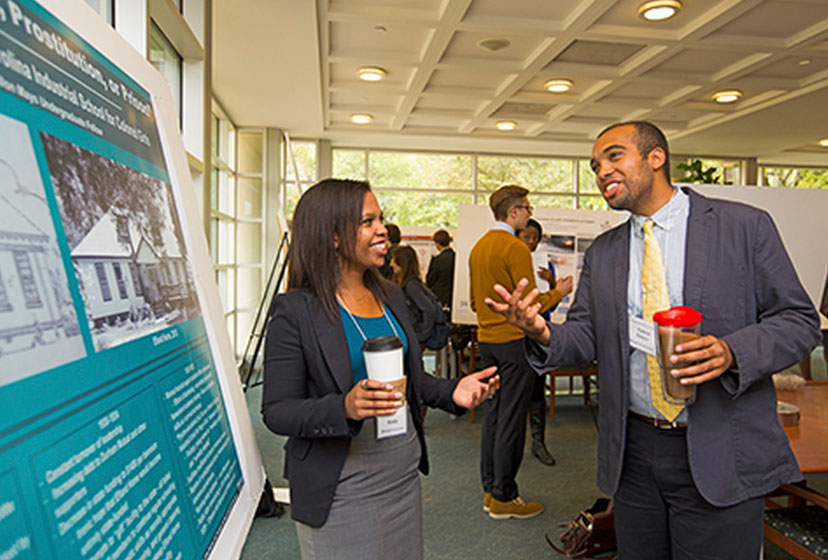Near the Richmond, Virginia home of senior Lauren Henley still stands the site of the Virginia State Industrial Home for Colored Girls. In the early 20th century, black girls were sent to the school for petty crimes or, more often, their perceived sins — having sex, skipping school, staying out.

Henley presented her research entitled, “‘Destined for Pregnancy, Prostitution, or Prison’: Negotiating Identity at the North Carolina Industrial School for Colored Girls,” in Oct. 14 Undergraduate Research Symposium in Washington University’s Olin Library.
Photo by Jerry Naunheim Jr./WUSTL Photos
“They were sentenced for violating black, middle-class values,” says Henley. “The black clubwomen who operated these reformatory schools wanted to ‘uplift the race.’ They truly thought if they could isolate them, they could make them respectable.”
Henley, a history major in Arts & Sciences, an Ervin scholar and a Mellon Mays Undergraduate Fellow, has devoted the past four years to this relatively new field of research. No surprise — she has found these schools, which were located in every southern state, to be oppressive. But, in some cases, they were also effective. Many of the girls enrolled at the Industrial School graduated and took good jobs. What if, Henley wonders, a similar model was tried today?
“The juvenile justice system came into being because people thought it atrocious to sentence young children to adult jails,” said Henley. “The systems that once were in place to rehabilitate young offenders are gone. We just keep building places to warehouse people, generally people of color.”
Henley came upon this topic — and her passion for research — by accident. She entered Washington University with plans to study law. But a happy accident landed her in the black women’s history class of Sowande Mustakeem, PhD, assistant professor of history. Mustakeem took her to the Missouri State Archives in Jefferson City to study Missouri’s reformatory school, which is still standing in Tipton, Missouri.
“I learned quickly that archives are isolating places and, at times, scary places. But they also are exciting places,” says Henley. “You go in and request all of these files and get boxes upon boxes. You think, ‘There is no way I can get through this’ and you are right. I takes weeks. But as you start opening the boxes and realizing what’s in them you realize you are literally touching history.
“For me to hold letters from young women who had been sent to the reformatory schools and know that this was their handwriting was shocking. I had these moments of being in this dead silent room where you just want to scream out of sheer excitement.”
Henley has earned the 2014 Lillian Hornsby Memorial Award from the Association of Black Women Historians. After graduation, Henley plans to earn her PhD in history. She would like to study the life of America’s first black female serial killer of the 20th century — Clementine Barnabet. Henley thinks she may have killed 50 people in 14 months.
“Serial killers aren’t typically black and they are not typically female. Her story is so anomalous that I have to know more,” said Henley. “I’m fascinated by the people history often forgets.”